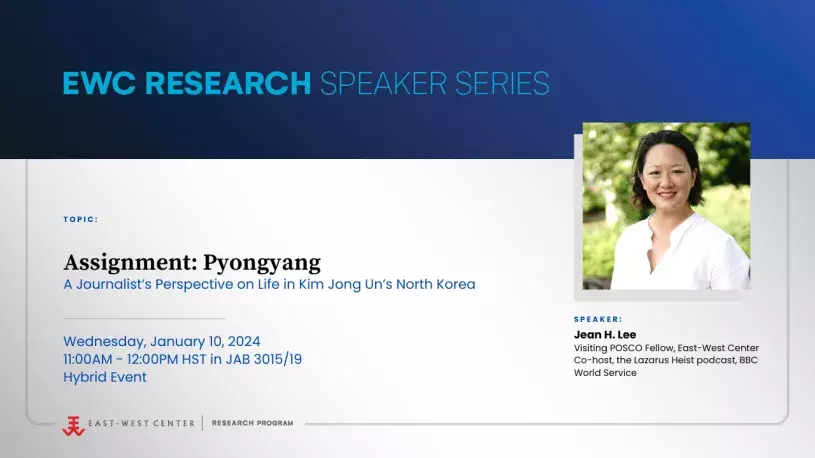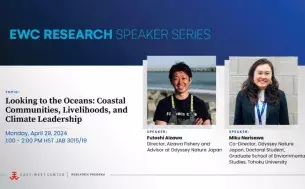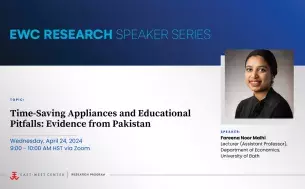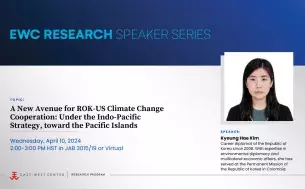Error message

OFFICE/DEPARTMENT
EWC Research Speaker Series
Wednesday, January 10th, 2024
11:00 a.m. - 12:00 p.m. HST
Assignment: Pyongyang
A Journalist’s Perspective on Life in Kim Jong Un’s North Korea
featuring
Jean H. Lee, Visiting POSCO Fellow, East-West Center
Co-host, the Lazarus Heist podcast, BBC World Service
North Korea is a nation of contradictions: one of the world’s poorest, yet capable of building ballistic missiles and nuclear weapons. Socialist, yet ruled by a modern-day monarch seeking absolute authority. Largely disconnected from the global Internet, yet able to produce some of the world’s most agile hackers. How do we make sense of North Korea — from what leader Kim Jong Un wants from his nuclear arsenal to how ordinary citizens are surviving in isolation — at a time when we have limited access and insight into daily life in the Democratic People’s Republic of Korea?
Jean H. Lee, a former AP correspondent who reported from North Korea from 2008 to 2017 and opened an AP news bureau in Pyongyang, shares her perspective on how to read and understand North Korea today. She will share how her time on the ground helped shape her current research on the North Korean hackers who are the focus on her most recent project, the Lazarus Heist podcast series for the BBC World Service.
Jean H. Lee is a visiting POSCO fellow at the East-West Center and co-host of the award-winning, Peabody-nominated Lazarus Heist podcast for the BBC World Service. Previously, she served as director of the Hyundai Motor-Korea Foundation Center for Korean History and Public Policy at the Woodrow Wilson International Center for Scholars in Washington, DC. As a journalist, Lee reported from across North America, Europe, Africa and Asia before becoming the first American correspondent to join the foreign press corps in North Korea in 2011. In January 2012, she opened AP’s Pyongyang news bureau. From 2008 to 2017, Lee visited farms, factories, schools, military academies and homes in the course of her exclusive coverage across the country. After AP, Lee served as a CNN contributor and has provided reporting and commentary to a wide range of media outlets, including the New York Times, Esquire, NPR, PRI, BBC, PBS Newshour and others. She also appears in the National Geographic series “Inside North Korea” as well PBS’ “Dictator’s Playbook,” Netflix’s “How to Become a Tyrant,” and the newly released documentary “Beyond Utopia.” Lee has a bachelor's degree in East Asian Studies and English literature from Columbia University, and a master's degree from the Columbia University Graduate School of Journalism. She is a member of the Council of Korean Americans, the National Committee on North Korea, and the Pacific Council on International Policy. She also serves as a non-resident fellow at the European Centre for North Korean Studies at the University of Vienna.
The views expressed are those of the speaker and do not necessarily reflect East-West Center policies or positions.
EWC Research Speaker Series
Wednesday, January 10th, 2024
11:00 a.m. - 12:00 p.m. HST
Assignment: Pyongyang
A Journalist’s Perspective on Life in Kim Jong Un’s North Korea
featuring
Jean H. Lee, Visiting POSCO Fellow, East-West Center
Co-host, the Lazarus Heist podcast, BBC World Service
North Korea is a nation of contradictions: one of the world’s poorest, yet capable of building ballistic missiles and nuclear weapons. Socialist, yet ruled by a modern-day monarch seeking absolute authority. Largely disconnected from the global Internet, yet able to produce some of the world’s most agile hackers. How do we make sense of North Korea — from what leader Kim Jong Un wants from his nuclear arsenal to how ordinary citizens are surviving in isolation — at a time when we have limited access and insight into daily life in the Democratic People’s Republic of Korea?
Jean H. Lee, a former AP correspondent who reported from North Korea from 2008 to 2017 and opened an AP news bureau in Pyongyang, shares her perspective on how to read and understand North Korea today. She will share how her time on the ground helped shape her current research on the North Korean hackers who are the focus on her most recent project, the Lazarus Heist podcast series for the BBC World Service.
Jean H. Lee is a visiting POSCO fellow at the East-West Center and co-host of the award-winning, Peabody-nominated Lazarus Heist podcast for the BBC World Service. Previously, she served as director of the Hyundai Motor-Korea Foundation Center for Korean History and Public Policy at the Woodrow Wilson International Center for Scholars in Washington, DC. As a journalist, Lee reported from across North America, Europe, Africa and Asia before becoming the first American correspondent to join the foreign press corps in North Korea in 2011. In January 2012, she opened AP’s Pyongyang news bureau. From 2008 to 2017, Lee visited farms, factories, schools, military academies and homes in the course of her exclusive coverage across the country. After AP, Lee served as a CNN contributor and has provided reporting and commentary to a wide range of media outlets, including the New York Times, Esquire, NPR, PRI, BBC, PBS Newshour and others. She also appears in the National Geographic series “Inside North Korea” as well PBS’ “Dictator’s Playbook,” Netflix’s “How to Become a Tyrant,” and the newly released documentary “Beyond Utopia.” Lee has a bachelor's degree in East Asian Studies and English literature from Columbia University, and a master's degree from the Columbia University Graduate School of Journalism. She is a member of the Council of Korean Americans, the National Committee on North Korea, and the Pacific Council on International Policy. She also serves as a non-resident fellow at the European Centre for North Korean Studies at the University of Vienna.
The views expressed are those of the speaker and do not necessarily reflect East-West Center policies or positions.









